仁爱版英语八年级Unit 4 Topic 2 Section B
仁爱版八年级英语上册 Unit 4 Topic 2 Section B 课件

1b
三、指导自学&四、巡视自学
1. Listen to 1a and mark T (True) or F (False).
录音1a-P91
1. The level of the Yushu earthquake was 6.1. ( )
2. Running out of the door is safer.
run out of stay under the table stay calm
Qinghai earthquake is terrible. It was a level 7.1 earthquake…
1. Summarize the using of thousand.
It killed more than two thousand people. Thousands of people died in the earthquake.
; hundreds of
五百万 five million; 数百万
.millions of
连用,
2. How to express care and comfort?
I was very sad when I got the news. I’m sorry to hear that. Don’t worry. He will be Ok. What’s the matter with you?
sentences in groups. 听说 hear about ;
倒塌 fall down ;
失去某人的家园
lose o;ne’s home
跑出……外 run out o;f
保持冷静 stay calm。
How to protect ourselves from the earthquake?
Unit4Topic2单词短语句型2021-2022学年仁爱版英语八年级上册

earthquake?Section A单词:1.earthquake n. 地震2.strike v.侵袭爆发;撞,撞击3.province n.省份,一级行政区4.missing adj.失踪的,丢失的,5.mobile adj.可移动的6.phone n.电话,电话机7.fire n.失火,火灾,火8.rainstorm n.暴风雨9.snowstorm n.雪暴,暴风雪Section A 短语:1.fall down 倒塌,掉下2.die out 灭绝3.die of / from 死于…原因4.another +数字+名词复数另外…5.=数字+more +名词复数6.in 2008 在2008年7.lose one’s life 失去生命,丧生8.protect …from… 保护…免受…伤害9.How terribl e ! 多么可怕!10.ask sb. for help 向某人求助11.ask sb. for sth. 向某人要某物12.ask sb to do sth 要求某人做某事13.ask sb not to do sth 要求某人不要做某事14.the number of+名词复数,…的数量15.a number of+名词复数,许多大量16.be late for 迟到17.prepare for 准备Section A汉译英练习:1.根据句意及汉语提示完成句子,每空一词。
2. 1. Many buildings _______ _______ (倒塌) in the earthquake.3. 2. The Tangshan earthquake was _______ _______ _______ (严重得多) than theYushu earthquake.4. 3. Many people _______ _______ _______ (遇难) or get hurt in kinds of accidents every year.5. 4. It took me _______ _______ (超过) three hours to get there by bike.6. 5. The pair of glasses can _______ your eyes _______ (保护) the sun.earthquake?Section B单词:1.level n.级别,水平,程度2.sad adj.难过的,悲哀的3.calm adj.镇静的,沉着的Section B 短语:1.hear of / about 听说2.fall down 倒塌3.more than 多于,超过4.two thousand 两千5.thousands of 数以千计的6.lose one’s life 失去生命7.how to protect 怎么样宝华特殊疑问词+不定式8.protect…from保护…免受…伤害9.under the table 在桌子下面10.I think so 我认为如此11.I don’t think so 我认为不是那样12.run out 跑出去,用完耗尽13.run out of 跑出…去,用完耗尽14.stay calm 保持冷静=keep calm15.What’s the matter with you ?16.=What’s wrong with you 怎么了17.I’m sorry to hear that 听到这些我很难过18.Don’t worry 不要担心19.worry about 担心20.be worried about 担心21.else 别的,其他的用在something、anything,what等后Section B必背句式:I don’t know which book I should buy.= I don’t know which book to buy.’Could you tell me how I can get to the shop.= Could you tell how to get to the shop.Section B汉译英练习:从方框中选择短语并用其适当形式填空,使句子通顺完整。
仁爱版八年级英语上册Unit4Topic2SectionB优质教案

八年级上册教案设计Unit 4 Our WorldTopic 2 How can we protect ourselves from the earthquake?Section BⅠ. Material analysisSection B的主要教学活动为1a, 3a和3b。
本节课主要通过Miss Wang和班里的学生之间的谈话引出玉树地震的话题,在对话中了解玉树地震的信息。
简单讲述了如何在地震中逃生的问题以及复习双多音节形容词的比较级和最高级形式。
第二部分通过听力训练的方式要求学生学习表达关心的句子。
3a部分主要通过图片、音标的提示,展示了有关灾难的名词。
复习了/ð/ /θ/的不同发音以及升降调、连读和不完全爆破。
教师在讲解音标的时候可以借助多媒体或者图片,让学生直观地感受唇形、齿形和口型。
Ⅱ. Teaching aimsKnowledge aims:1. 能根据音标正确朗读出单词表中本课的单词:level, sad, calm, typhoon等。
2. 能在老师的引导下,读出句子的升降调、连读和不完全爆破,分清/ð/ /θ/之间的区别。
3. 能正确拼读并运用单词表中的黑体单词:level, sad等。
能根据音标正确地书写typhoon, flood 等。
4. 能掌握双多音节形容词的比较级和最高级的变化规则,能在具体句子中正确地应用。
5. 能正确运用本课所学知识谈论地震的话题,能够用所学知识向受灾的人们给予关爱。
Skill aims:1. 能听懂有关谈论地震的话题及用形容词比较级最高级谈论关于灾难的话题。
2. 能谈论灾难的情况,并能用所学知识表达自己的关怀。
3. 能正确朗读课本的文本材料及含有/ð/ /θ/的句子的正确发音。
4. 能用形容词的比较级和最高级写一篇有关灾难程度的文章。
Emotional aims:1. 通过本课学习,了解自然灾害带给人类的危害,学会沉着应对困难。
仁爱版英语八年级上册:Unit 4 Topic 2 How can we protect ourselves from the earthquake?Section A
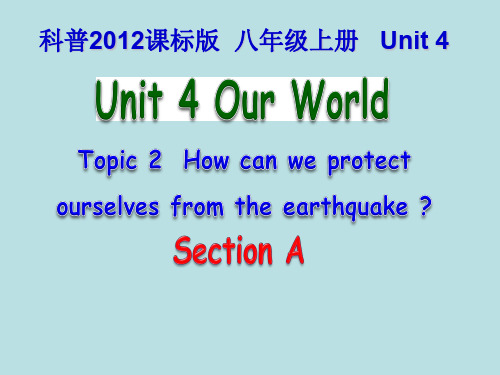
Key sentences:
1. A terrible earthquake struck Qinghai. 2. Was it serious? 3. I’m very sorry to hear that.
4. I know that there were another two terrible earthquakes in China. 5. Which was the most serious? 6. More than 240000 people lost their lives in it. 7. How can we protect ourselves from the earthquake?
An earthquake happened in Qinghai Province.
An earthquake happened in Qinghai Province.
strike
过去式 struck
/str aɪk/ v.侵袭,爆发
/strʌk/
同 义 句
An earthquake struck Qinghai Province.
K: And I know that there were anothe失prr去towt某oect人etrs的rbib生lfer命oemartshtqhuakes in
China. ask sb. for help
保护某人免受某物的伤害
L: Really? 向W某hic人h求wa助s the most serious?
火眼金睛找规则:
单音节和少数双音节形容词
blue bluer
the bluest
八年级英语仁爱版上册Unit2_Topic2_SectionB优质课教案

Unit2 Topic2 SectionB优质课教案主讲教师:林海燕指导教师:林晴晖I. Material analysis:本课时的主要活动为1a, 3a和3b。
本课就吸烟这个坏习惯展开讨论,呈现了本单元语法重点:情态动词must+动词原形:I must ask him to give up smoking.表示建议、劝告。
同时巩固了动名词做主语的句式:Smoking is bad for his health.通过学习Section B,让学生能够辨别好习惯与坏习惯,并能帮助亲人戒掉坏习惯。
课后要求学生会用动名词做主语造句,能用must提建议。
Ⅱ. Teaching aims and demands1. New wordsarticle, smoke, cancer, even, energy, necessary, active2. Phrasesread in the sun, be bad for…, an article about smoking, in the newspaper, help him relax,the article says, cause cancer, ask sb. to do sth., give up sth./doing sth., show sth.to sb.3. Useful expressions(1)I'm reading an article about smoking in the newspaper.(2)He thinks smoking can help him relax.(3)The article says smoking is bad for our lungs and it can even cause cancer.(4)I must ask him to give up smoking.4. Modal verbmust and mustn’t5. Skill aims(1)Talk about good habits and bad habits.(2)Learn to use modal verb must and mustn’t correctly.(3)Learn to use intonation to read the dialogue correctly.6. Emotional aims:Learn to keep good habits and give up bad habits.Ⅲ. The key points and difficult points1. Key points(1)Learn to use modal verb must and mustn’t correctly.(2)I must ask him to give up smoking.2. Difficult pointsLearn to use gerund as subject correctly.Ⅳ. Learning strategies1.通过图片教学和句子翻译记忆词汇。
仁爱版八年级英语上册Unit2Topic1.SectionB教学设计
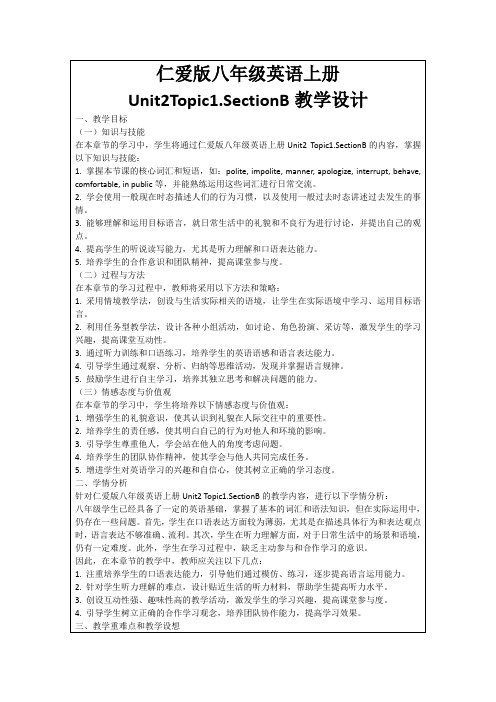
-教师给予反馈、指导,帮助学生查漏补缺。
(五)总结归纳
1.教学活动设计:
-教师引导学生回顾本节课所学内容,总结知识点。
-学生分享学习收获,教师给予评价、鼓励。
2.教学目标:
-帮助学生巩固所学知识,形成知识体系。
-提高学生的学习自信心,激发学习兴趣。
3.教学过程:
2.学会使用一般现在时态描述人们的行为习惯,以及使用一般过去时态讲述过去发生的事情。
3.能够理解和运用目标语言,就日常生活中的礼貌和不良行为进行讨论,并提出自己的观点。
4.提高学生的听说读写能力,尤其是听力理解和口语表达能力。
5.培养学生的合作意识和团队精神,提高课堂参与度。
(二)过程与方法
在本章节的学习过程中,教师将采用以下方法和策略:
-教师引导学生回顾本节课所学词汇、语法、听力等知识点。
-学生分享学习收获,教师给予积极评价、鼓励。
-布置课后作业,为下一节课的学习做好铺垫。
五、作业布置
针对仁爱版八年级英语上册Unit2 Topic1.SectionB的教学内容,以下为作业布巩固所学词汇、语法知识。
-引导学生从文化角度认识礼貌行为的重要性,培养其良好的跨文化交际能力。
四、教学内容与过程
(一)导入新课
1.教学活动设计:
-利用图片、视频等多媒体资源,展示日常生活中礼貌和不良行为的场景,引导学生关注和思考。
-邀请学生分享自己在生活中遇到的不礼貌行为及感受,激发学生对本节课主题的兴趣。
2.教学目标:
-引起学生对礼貌行为的关注,激发学习兴趣。
4.鼓励学生互相交流、讨论,共同完成作业,培养合作精神。
-通过小组讨论,让学生分享自己遇到的不礼貌行为及感受,激发学生的学习动机。
仁爱版英语八年级上册:Unit 4 Topic 2 How can we protect ourselves from the earthquake 教案

Unit 4 Our World Topic 2 How can we protect ourselves from theearthquake?【教学分析】本单元以Our World 为主题。
第二话题主要围绕玉树地震,地震中如何保护自己等话题展开。
同时学习表达安慰,关心等的功能句。
本话题的主要语法是:多音节和部分双音节形容词比较级和最高级的变化规律。
主要句型有:The mobile phone is more useful than the telephone., The computer is the most useful of the three., The safest place is under a strong table or desk., Was it serious?, I’m very sorry to hear that., Don’t worry.等。
语音版块复习字母i,o和字母组合oo,ou,ow,or,aie在单词中的发音规则;区分/θ/和/ ð/的发音,学习降调,继续训练连读和不完全爆破。
Project的活动“Caring About the Children From Disaster Areas”为学生灵活运用该话题相关语言知识和创造了条件,训练学生用英语做事情的能力。
本话题建议用五课时完成。
第一课时:Section A—1a,1b,1c,1d第二课时:Section A—2a, 2b, Section B—3a, 3b Section A—3第三课时:Section B—1a, 1b, 1c, 2, 4第四课时:Section C—1a, 1b,1c, 2a, 2b,2c第五课时:Section D—Grammar and Functions, 1, 2, Project【第一课时】(Section A—1a,1b,1c,1d)【教学设计】本节课的课型为听说课,主要活动为Section A-1a。
仁爱版八年级英语上册Unit2Topic2SectionB优秀教学案例
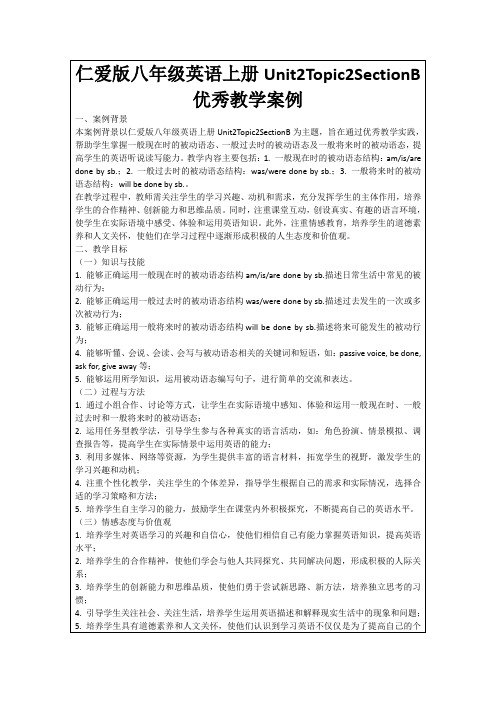
(三)学生小组讨论
1.学生分组讨论,运用一般现在时的被动语态描述小组成员之间的互动,如:“Our project is completed by us together.”。
2.各小组汇报讨论成果,其他小组成员倾听、评价,教师给予指导和反馈。
5.培养学生自主学习的能力,鼓励学生在课堂内外积极探究,不断提高自己的英语水平。
(三)情感态度与价值观
1.培养学生对英语学习的兴趣和自信心,使他们相信自己有能力掌握英语知识,提高英语水平;
2.培养学生的合作精神,使他们学会与他人共同探究、共同解决问题,形成积极的人际关系;
3.培养学生的创新能力和思维品质,使他们勇于尝试新思路、新方法,培养独立思考的习惯;
4.情感态度与价值观:教师注重情感教育,将语言学习与学生的生活经历、兴趣爱好相结合,培养学生积极的学习态度和价值观。通过情感态度与价值观的培养,使学生在学习过程中逐渐形成积极的人生态度和价值观,提高了学生的道德素养和人文关怀。
5.教学策略:本案例采用多元化的教学策略,如情景创设、问题导向、小组合作等,使学生在实际语境中学习、运用英语。教师充分发挥引导者、组织者、评价者的角色,为学生提供有效的指导和支持,提高了教学效果和学生的学习成果。
二、教学目标
(一)知识与技能
1.能够正确运用一般现在时的被动语态结构am/is/are done by sb.描述日常生活中常见的被动行为;
2.能够正确运用一般过去时的被动语态结构was/were done by sb.描述过去发生的一次或多次被动行为;
3.能够正确运用一般将来时的被动语态结构will be done by sb.描述将来可能发生的被动行为;
新仁爱版八年级英语上册Unit4 Topic 2 Section B 课件

1. I think science is _C__ than Japanese.
A. much important
B. important
C. much more important D. more much important
The Yushu earthquake was
terrible. Many … The earthquake … and … Many children … and couldn’t … Miss Wang … that … could be … and the
most important … is to …
last year.
A. more tall
B. more taller
C. very taller
D. much taller
5. It was very hot yesterday, but it is __A_ today.
A. even hotterB. more Nhomakorabeahotter
C. much more hot D. much hot
Topic 2
How can we protect ourselves from the earthquake?
The earthquake is the most serious. How can we protect ourselves from
the earthquake?
Talk something.
How to protect ourselves from an earthquake.
Running out of the door could be dangerous.
仁爱版英语八年级上册 Unit2 Topic2 SectionB 教学设计

Unit2 Topic2 SectionB 教学设计Ⅰ. Material analysisSection B 是本单元第二课时和第三课时。
主要活动为Section B 的1a, 3a和3b。
本课就吸烟这个坏习惯展开讨论,呈现了本单元语法重点:情态动词must + 动词原形:I must ask him to give up smoking. 表示建议、劝告。
同时巩固了动名词做主语的句式:Smoking is bad for his health. 通过学习Section B, 让学生能够辨别好习惯与坏习惯,并能帮助亲人戒掉坏习惯。
课后要求学生会用动名词做主语造句,能用must提建议。
Ⅱ. Teaching aimsKnowledge aims:1. 能正确运用以下短语巩固动名词短语做主语的书面表达:read in the sun, give up smoking, go to school without breakfast, take a walk,study late, drink enough water2. 能正确地运用must, mustn’t进行劝告或提建议:I must ask him to give up smoking.3. 能正确辨别/7/, /3 /和/D/的发音。
4. 朗读时连读现象。
Skill aims:1. 能听懂有关影响健康的好习惯和坏习惯的话题。
2. 能熟练地运用must, mustn’t提建议。
3. 能正确朗读有关影响健康的好习惯和坏习惯的对话或文章。
Emotional aims:通过语言学习,影响学生的自身品格,要学会辨别好习惯与坏习惯,养成好习惯,戒掉坏习惯,并帮助他人戒掉坏习惯,保持健康。
Ⅲ. The key points and difficult pointsKey points:理解和运用must 表示“建议、劝告”的用法:I must ask him to give up smoking. 我得劝他戒掉烟。
仁爱版八年级上册英语第四单元笔记

第一部分:单元主题介绍1. 本单元主题:Living well2. 生活质量的重要性3. 家庭、朋友和身心健康的关系4. 健康的生活方式5. 身心健康的重要性第二部分:词汇与语法1. 本单元重点词汇介绍- healthy lifestyle:健康的生活方式 - nutrition:营养- balanced diet:均衡饮食- physical activity:身体活动- mental well-being:心理健康2. 语法知识- 情态动词can和should的用法- 被动语态的构成- 定语从句的使用第三部分:听力与口语训练1. 听力练习- 听取健康生活方式的建议- 听取他人的健康问题并提出建议2. 口语训练- 和同学一起讨论健康饮食和运动计划 - 向他人提出关于改善生活方式的建议第四部分:阅读与写作练习1. 阅读练习- 阅读健康饮食和运动的文章- 阅读有关精神健康的文章2. 写作练习- 撰写一篇关于健康饮食的文章- 撰写一篇有关身心健康的文章第五部分:文化与实践1. 健康生活方式在我国的文化基础- 我国人的饮食文化- 传统的养生方式- 当代我国人的生活方式变化2. 实际操作- 设计健康餐单- 制定身体活动计划- 草拟一个关于身心健康的口号总结部分1. 本单元学习目标:了解并谈论健康生活方式的重要性,学习使用有关健康的词汇和语法知识,提高听力口语能力,培养健康的生活习惯。
2. 落实方式:听力、口语练习、阅读和写作训练以及实际操作3. 评价方式:课堂表现、作业完成情况、口头表达能力和实际操作成果4. 下一步学习目标:巩固健康生活方式的词汇和语法知识,提高口语表达能力,进一步实践健康生活方式。
第六部分:课堂实践与探究1. 互动教学- 学生分组讨论健康生活方式的好处和挑战- 鼓励学生共享个人的健康习惯和经验- 学生展示并讨论他们设计的健康餐单和身体活动计划2. 探究活动- 学生小组展开小研究,调查同学们的健康习惯和看法- 分析调查结果,比较不同芳龄段和性莂在健康生活方式上的差异- 总结调查结果,提出改善健康生活方式的建议第七部分:作业与评价1. 作业安排- 完成阅读练习并做相关的练习题- 撰写关于健康饮食和运动计划的小作文- 设计一个宣传海报,宣传健康生活方式的重要性- 进行身体活动,记录并反思自己的运动习惯2. 评价方法- 课堂表现和参与度- 书面作业完成情况- 口头表达能力和互动讨论的贡献- 对健康生活方式的实际行动和改变第八部分:家校合作1. 家长交流会- 邀请家长参加学校举办的健康生活方式讲座- 鼓励家长和学生共同制定健康生活方式的目标和计划- 促进家长参与学校的健康生活方式教育2. 家庭作业- 鼓励学生和家长共同制定并实施家庭健康计划- 家庭成员共同参与食品采购和烹饪,注重均衡饮食- 家庭一起进行户外活动,促进亲子关系和健康生活方式的实践第九部分:华文联结1. 本单元相关的华文学习- 学习华文课上与健康生活方式相关的词汇与写作- 阅读华文文章,了解我国传统的健康理念和养生方式- 通过华文学习,拓宽对健康生活方式的跨文化认识总结部分在本单元的学习中,学生通过词汇、语法、听力、口语、阅读、写作、实践等多种方式全面提高了“Living well”主题下的各项能力。
仁爱英语八年级上册Unit1、2、3、4课文翻译

仁爱英语八年级上册U n i t1、2、3、4课文翻译(总13页)--本页仅作为文档封面,使用时请直接删除即可----内页可以根据需求调整合适字体及大小--Unit1Section A 1a迈克尔:康康,你好。
康康:迈克尔,你好。
你要去打篮球吗?我看见你暑假期间几乎每天都打篮球。
迈克尔:是呀。
你知道,周日我们班和三班要举行一场篮球赛康康:而且这是本学期我们学校的第一场篮球赛。
迈克尔:你来为我们加油好吗?康康:当然,我很乐意。
我希望我们队获胜。
迈克尔:我也是。
Section B 1a迈克尔:玛利亚,你最喜爱的运动是什么?玛利亚:当然是篮球了。
迈克尔:我也是。
那你最喜欢的运动员是谁?玛利亚:勒布朗.詹姆斯。
你呢?迈克尔:我最喜欢姚明。
你知道他的一些情况吗?玛利亚:知道。
他身高两米二六。
他效力于NBA的休斯顿火箭队。
迈克尔:对,他很棒!将来我要成为一个像他那样的篮球运动员。
那是我的梦想。
你长大了想干什么?玛利亚:我想成为一名舞蹈家。
2a这里有一些体育明星的照片,他们是刘翔、迈克尔.菲尔普斯和张怡宁。
刘翔是来自上海的一个充满活力的年轻人。
他是世界上最优秀的短跑运动员之一。
他在2004年雅典奥运会上打破奥运会纪录,并赢得了一枚金牌,但是在2008年北京奥运会上,由于脚伤他不得不放弃了比赛。
多么遗憾!菲尔普斯来自美国,他在北京奥运会的游泳比赛中赢得了八枚金牌。
他是第一个在一届奥运会上赢得如此多金牌的运动员。
作为世界上最优秀的女乒乓求运动员之一的张怡宁在雅典奥运会和北京奥运会上分别赢得两枚金牌。
Section C1a安非常喜欢运动。
她每周骑两次自行车,还经常星期天去爬上。
她每天在体育馆花半个小时来锻炼。
她星期六学打棒球,现在她棒球打得相当好。
她还擅长跳跃。
下周末将举行校运动会。
她打算参加跳高和跳远比赛。
她的同学们将会为她加油。
他们确信她会赢。
Section D1a昨天,著名足球明星大卫.贝克汉姆和他的队友抵达北京。
新版仁爱英语八年级上UNIT4短语总结,课文翻译,语法
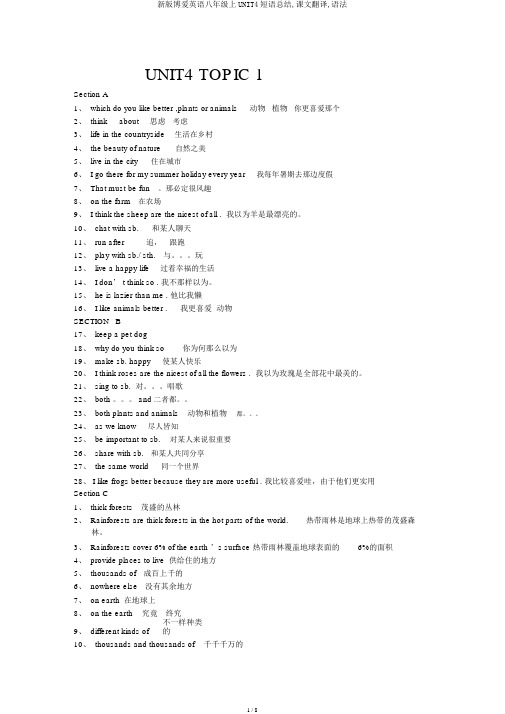
UNIT4 TOPIC 1Section A1、 which do you like better ,plants or animals动物植物你更喜爱那个2、 think about思虑考虑3、 life in the countryside生活在乡村4、 the beauty of nature自然之美5、 live in the city住在城市6、 I go there for my summer holiday every year我每年暑期去那边度假7、 That must be fun。
那必定很风趣8、 on the farm在农场9、 I think the sheep are the nicest of all . 我以为羊是最漂亮的。
10、 chat with sb.和某人聊天11、 run after追,跟跑12、 play with sb./ sth.与。
玩13、 live a happy life过着幸福的生活14、 I don’ t think so . 我不那样以为。
15、 he is lazier than me . 他比我懒16、 I like animals better .我更喜爱动物SECTION B17、 keep a pet dog18、 why do you think so你为何那么以为19、 make sb. happy使某人快乐20、 I think roses are the nicest of all the flowers . 我以为玫瑰是全部花中最美的。
21、 sing to sb. 对。
唱歌22、 both 。
and二者都。
23、 both plants and animals动物和植物都。
24、 as we know尽人皆知25、 be important to sb.对某人来说很重要26、 share with sb.和某人共同分享27、 the same world同一个世界28、 I like frogs better because they are more useful . 我比较喜爱哇,由于他们更实用Section C1、 thick forests茂盛的丛林2、 Rainforests are thick forests in the hot parts of the world.热带雨林是地球上热带的茂盛森林。
北京仁爱版初中英语八年级上册 Unit 4 Topic 2 课文翻译

北京仁爱版初中英语八年级上册Unit 4 Topic 2 课文翻译SectionA-1aKangkang:Li Ming,come and look! A terrible earthquake struck Qinghai!康康:李明,快来看!青海发生了可怕的地震!Li Ming:Oh,no! When and where?李明:哦,不是吧!什么时候什么地点?Kangkang:It stuck Yushu in Qinghai Province early this morning.康康:今天早上发生在青海省玉树县。
Li Ming:Was it serious?李明:严重吗?Kangkang:Yes. May buildings fell down. Some people died and many people are missing.康康:严重。
很多楼房都塌了。
有些人遇难了,很多人都失踪了。
Li Ming:I'm very sorry to hear that.李明:听到这些真的很抱歉。
Kangkang:And I know that there were another two terribe earthquakes in China.康康:我还知道中国有另外两次严重的地震。
Li Ming:Really? Which was the most serious?李明:真的吗?哪一次最严重?Kangkang:I think the Wenchuan earthquake in 2019 was more serious than this one,but the Tangshan earthquake in 1976 was the most serious. More than 240,000 people lost their lives in it.康康:我觉得2019年的汶川地震比这次更严重,但是1976年的唐山地震是最严重的。
仁爱版英语八年级上册教材同步讲解及练习附答案

仁爱英语八年级上册Unit 1 topic 1Section A语言点讲解1.I saw you play basketball almost every day during the Summer holidays.常见的感官动词有:see, watch, hear, smell, feel 等。
后可接①动词ing形式,表此动作正在发生。
②动词原形,不表此动作正在发生, 表此动作已完成或存在的事实。
① Do you smell something ? (burn) 答案:burning② I often see him basketball after class. ( play ) 答案:play2.There is going to be a basketball game between Class Three and our class this Sunday.There be 句型:表某地有某物. 而have 表示某人有…(1)There is/ are..表现在某地有某物,is/are取决于后面的名词是单数还是复数,单数用is 复数用are,如①There is a pen and two rulers on the desk.②There are two rulers and a pen…(2) There was/were…表过去某地有某物。
was/were的用法也遵循就近原则。
(3)There will be 或There is/are going to be 表某地将有某事物。
不能说成There willhave…(题) a match in our school between Class Three and Class Four next week.3.Would you like to come and cheer us on? ----- Sure, I’d love to.(1)Would you like + 不定式?表建议或邀请。
仁爱八年级u4t2知识点
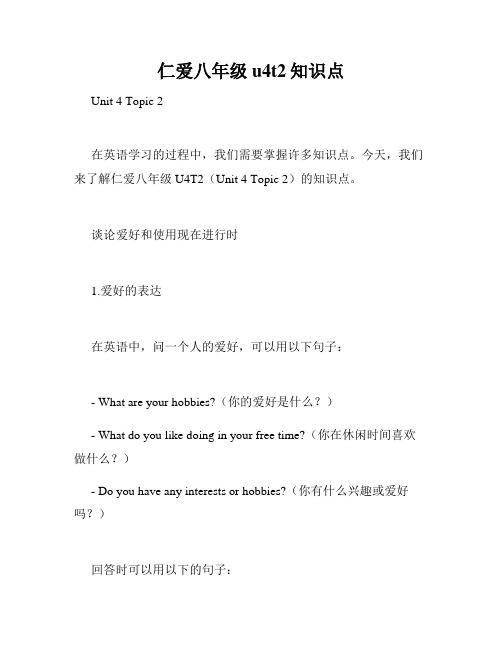
仁爱八年级u4t2知识点Unit 4 Topic 2在英语学习的过程中,我们需要掌握许多知识点。
今天,我们来了解仁爱八年级U4T2(Unit 4 Topic 2)的知识点。
谈论爱好和使用现在进行时1.爱好的表达在英语中,问一个人的爱好,可以用以下句子:- What are your hobbies?(你的爱好是什么?)- What do you like doing in your free time?(你在休闲时间喜欢做什么?)- Do you have any interests or hobbies?(你有什么兴趣或爱好吗?)回答时可以用以下的句子:- I like reading novels and playing basketball.(我喜欢读小说和打篮球。
)- I enjoy listening to music and watching movies.(我喜欢听音乐和看电影。
)- My hobbies are playing soccer and painting.(我的爱好是踢足球和画画。
)2.现在进行时的表达现在进行时是讲述目前正在发生的动作或状态。
在结构上,需要使用be动词+动词-ing形式,例如:- She is playing basketball with her friends. (她正在和朋友们打篮球。
)- I'm studying English in the library.(我正在图书馆学英语。
)- They are having a party at home.(他们正在家里开派对。
)需要注意的是,我们不能把助动词be和动词主语交换位置,也不能省略be动词。
练习1.根据中文提示,用英文表达出来。
- 我的妹妹正在看电视。
She is watching TV.- 你喜欢做什么运动?What sports do you like playing?- 他现在正在餐厅里吃饭。
- 1、下载文档前请自行甄别文档内容的完整性,平台不提供额外的编辑、内容补充、找答案等附加服务。
- 2、"仅部分预览"的文档,不可在线预览部分如存在完整性等问题,可反馈申请退款(可完整预览的文档不适用该条件!)。
- 3、如文档侵犯您的权益,请联系客服反馈,我们会尽快为您处理(人工客服工作时间:9:00-18:30)。
Listen again and fill in the blanks. Then read it to your partner . 视频1a-P91 The Yushu earthquake was terrible. Many buildings fell down. The earthquake _______ killed ________ hurt more than two thousand people and ______ more people. Many children _____ their homes and lost couldn’t go to school. Miss Wang told them that dangerous running out of the door could be ____________ stay and the most important thing is to ________ calm.
3a Look at the pictures and write down the words. 录音3a-P92
/ 'sn.,st5m / / 'rVnst5m / /t@'f6n/ typhoon snowstorm _____________ _____________ _____________ rainstorm
(5) What’s the matter with you? 你怎么了? What’s the matter with…? = What’s the trouble with…? =What’s wrong with…? 意为“(某人/物)出什么事了/怎么了?” (6) He can’t go to school of do anything else now. 他现在既不能去上学也不能做别的事情。 anything else“别的东西/事情”。 else在这里作 为形容词修饰不定代词anything。 【拓展】修饰不定代词的形容词放在不定代词的后面。 如: There is something wrong with my computer. 我的 电脑出了点问题。
(1) Did you hear about the Yushu earthquake in Qinghai Province? hear about = hear of 听说 I heard about the good news not long ago. hear from 收到……的来信 I heard from my friend yesterday. (2) Do you know how to protect yourselves from the earthquake? “疑问词+动词不定式”构成一类特殊的不定式,常 在句中作主语、表语、宾语等。 How to get there is a question. (作主语) The question is when to start. (作表语) I don’t know what to do next. (作宾语)
1b
Listen to 1a and mark T (True) or F (False).
录音1a-P91
1. The level of the Yushu earthquake was 6.1. 2. Running out of the door is safer. (
( )
)
3. The most important thing is to stay calm.
B: I think it is more dangerous than flood.
The falling tone is often used in statements, exclamations, commands and special questions.
1.The knowledge about earthquake .
typhoon
flood drought forest fire earthquake
Natural disasters snowstorm rainstorm typhoon flood drought forest fire earthquake
A: __________ is serious.
1. / F / : think earthquake toothache
anything
/ N / : this
their
themmother2. How terrible ! My God !
3. Li Ming, come an(d) look !
4. A: Wha(t) do you think of snowstorm ?
2
Listen to the conversation and fill in the blanks. Then practice in 录音2-P91 pairs.
Michael: Hey, Kangkang. What’s the matter with you? broke Kangkang: I’msad ______ because my pen pal ________ his right arm in the Yushu earthquake. serious Michael: I’m sorry to hear that. Is it _______ _ ?
(3) I think we should run out of the door. out of 意为“(从……里)出来;没有,缺少”等。 Don’t look out of the window. 不要向窗外看。 I’m running out of ideas. 我快没办法了。 (4) No, running out can be dangerous. running 为动名词,作句子的主语。动名词作主语时, 谓语动词用单数形式。 Playing sports is good for us. 运动对我们有好处。
Which is the most serious natural disaster (自然灾害) of all the above ? Interview your classmates and complete the table. Natural disasters snowstorm rainstorm The most serious
/fl7d/ /dr=t/ flood _____________ _____________ drought
/ ' fDrIst /f}9/ /forest fire _____________
Did you hear of any serious earthquakes in China?
Yushu earthquake Wenchuan earthquake Tangshan earthquake
(
)
How to protect ourselves from an earthquake. Running out of the door could be dangerous.
We should stay under the table.
We had better to stay calm.
1c
1.失去某人的家园 lose one’s home 2.跑出„„外 run out of
3.保持冷静
stay calm
The Yushu earthquake was terrible. Many … The earthquake … and … Many children … and couldn’t … Miss Wang … that … could be … and the most important … is to …
The most serious
B: I think ________ is more serious than ________.
C: Yes, but _________ is the most serious of the three.
John thinks … is more dangerous than … He also thinks … is the most dangerous …
3b
Listen and pay attention to the marked parts and intonation. Read after the tape and imitate. Then work in pairs and use the words in 3a and the comparative or superlative forms of adjectives to practice. 录音3b-P92
2. Some phrases in the dialog.
lose one’s home
run out of stay calm
1.背诵1a。 2. 收集有关自然灾害的逃生方法。
go to school Kangkang: Yes. He can’t ________________ or do anything else now. He is very sad.
Michael: Don’t worry. He’ll be OK. We can do something help to _______ him. Kangkang: Thanks a lot.
